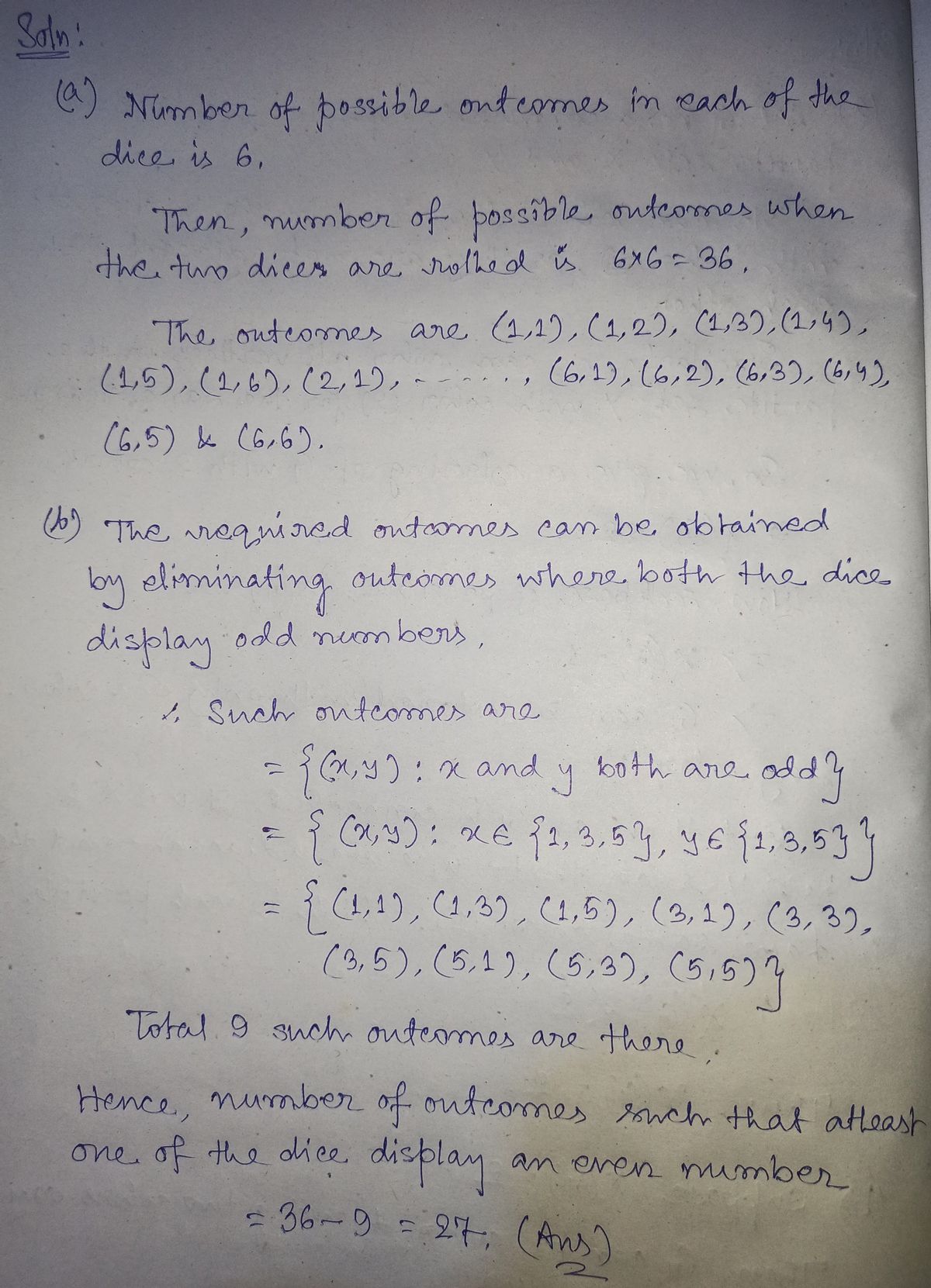(a) How many possible outcomes are there? (b) How many outcomes are there such that at least one of the two dice displays an even number? (c) Let E be the event that a sum of 6 is rolled, and let F be the event that the first die is 2. Are E and F independent? Support your answer mathematically, that is, determine whether P(EF) = P(E) · P(F).
(a) How many possible outcomes are there? (b) How many outcomes are there such that at least one of the two dice displays an even number? (c) Let E be the event that a sum of 6 is rolled, and let F be the event that the first die is 2. Are E and F independent? Support your answer mathematically, that is, determine whether P(EF) = P(E) · P(F).
Advanced Engineering Mathematics
10th Edition
ISBN:9780470458365
Author:Erwin Kreyszig
Publisher:Erwin Kreyszig
Chapter2: Second-order Linear Odes
Section: Chapter Questions
Problem 1RQ
Related questions
Question

Transcribed Image Text:For the following questions, assume two standard 6-sided dice are rolled.
![**Question Set: Probability with Two Dice**
This set of questions explores the probability of various events occurring when two dice are rolled.
**(a) How many possible outcomes are there?**
When two dice are rolled, each die has 6 faces, resulting in a total number of outcomes calculated as:
\[
6 \times 6 = 36
\]
Thus, there are 36 possible outcomes.
**(b) How many outcomes are there such that at least one of the two dice displays an even number?**
To answer this, consider the complementary event where neither die displays an even number, meaning both display odd numbers. Each die has 3 odd numbers (1, 3, 5). Therefore, the number of outcomes with both dice showing odd numbers is:
\[
3 \times 3 = 9
\]
Thus, the number of outcomes where at least one die shows an even number is:
\[
36 - 9 = 27
\]
**(c) Let \(E\) be the event that a sum of 6 is rolled, and let \(F\) be the event that the first die is 2. Are \(E\) and \(F\) independent? Support your answer mathematically, that is, determine whether \(P(E \cap F) = P(E) \cdot P(F)\).**
- **Event \(E\):** Possible outcomes for a sum of 6 are: (1, 5), (2, 4), (3, 3), (4, 2), (5, 1). There are 5 outcomes.
- **Probability \(P(E)\):**
\[
P(E) = \frac{5}{36}
\]
- **Event \(F\):** Possible outcomes where the first die is 2: (2, 1), (2, 2), (2, 3), (2, 4), (2, 5), (2, 6). There are 6 outcomes.
- **Probability \(P(F)\):**
\[
P(F) = \frac{6}{36} = \frac{1}{6}
\]
- **Event \(E \cap F\):** Outcome (2, 4) satisfies both events.
- **Probability \(P(E \cap F)\):**
\[](/v2/_next/image?url=https%3A%2F%2Fcontent.bartleby.com%2Fqna-images%2Fquestion%2F0db8c0f3-7e1f-4cf8-bdbd-38ddd8711042%2F9f9c6506-4fd0-4a4b-b44a-0db65673e4bf%2F9mez8_processed.png&w=3840&q=75)
Transcribed Image Text:**Question Set: Probability with Two Dice**
This set of questions explores the probability of various events occurring when two dice are rolled.
**(a) How many possible outcomes are there?**
When two dice are rolled, each die has 6 faces, resulting in a total number of outcomes calculated as:
\[
6 \times 6 = 36
\]
Thus, there are 36 possible outcomes.
**(b) How many outcomes are there such that at least one of the two dice displays an even number?**
To answer this, consider the complementary event where neither die displays an even number, meaning both display odd numbers. Each die has 3 odd numbers (1, 3, 5). Therefore, the number of outcomes with both dice showing odd numbers is:
\[
3 \times 3 = 9
\]
Thus, the number of outcomes where at least one die shows an even number is:
\[
36 - 9 = 27
\]
**(c) Let \(E\) be the event that a sum of 6 is rolled, and let \(F\) be the event that the first die is 2. Are \(E\) and \(F\) independent? Support your answer mathematically, that is, determine whether \(P(E \cap F) = P(E) \cdot P(F)\).**
- **Event \(E\):** Possible outcomes for a sum of 6 are: (1, 5), (2, 4), (3, 3), (4, 2), (5, 1). There are 5 outcomes.
- **Probability \(P(E)\):**
\[
P(E) = \frac{5}{36}
\]
- **Event \(F\):** Possible outcomes where the first die is 2: (2, 1), (2, 2), (2, 3), (2, 4), (2, 5), (2, 6). There are 6 outcomes.
- **Probability \(P(F)\):**
\[
P(F) = \frac{6}{36} = \frac{1}{6}
\]
- **Event \(E \cap F\):** Outcome (2, 4) satisfies both events.
- **Probability \(P(E \cap F)\):**
\[
Expert Solution
Step 1

Step by step
Solved in 2 steps with 2 images

Recommended textbooks for you

Advanced Engineering Mathematics
Advanced Math
ISBN:
9780470458365
Author:
Erwin Kreyszig
Publisher:
Wiley, John & Sons, Incorporated

Numerical Methods for Engineers
Advanced Math
ISBN:
9780073397924
Author:
Steven C. Chapra Dr., Raymond P. Canale
Publisher:
McGraw-Hill Education

Introductory Mathematics for Engineering Applicat…
Advanced Math
ISBN:
9781118141809
Author:
Nathan Klingbeil
Publisher:
WILEY

Advanced Engineering Mathematics
Advanced Math
ISBN:
9780470458365
Author:
Erwin Kreyszig
Publisher:
Wiley, John & Sons, Incorporated

Numerical Methods for Engineers
Advanced Math
ISBN:
9780073397924
Author:
Steven C. Chapra Dr., Raymond P. Canale
Publisher:
McGraw-Hill Education

Introductory Mathematics for Engineering Applicat…
Advanced Math
ISBN:
9781118141809
Author:
Nathan Klingbeil
Publisher:
WILEY

Mathematics For Machine Technology
Advanced Math
ISBN:
9781337798310
Author:
Peterson, John.
Publisher:
Cengage Learning,

